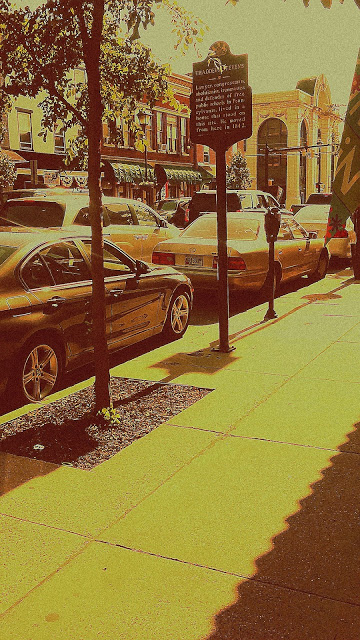And no man putteth new wine into old bottles; else the new wine will burst the bottles, and be spilled, and the bottles shall perish. But new wine must be put into new bottles; and both are preserved. Luke 5:37 -38 From “The Freedom of the Christian Man” by Helmut Thielicke we have an explaining of the parable of Jesus from Luke. He says, “the appeal to freedom becomes good news only when our existence is given a new foundation and then we are enabled to be free.”” …only if his mind is given the dignity of being a maker of decisions…”” …he makes decisions because a decision has been made concerning him.” Beloved, unless a man be born again he cannot see the kingdom of God. Another quote from the same source goes: “… for the person who has not been made free to love, freedom is something that demands too…
Tag: <span>freedom</span>
Sin describes a continual attempt at hitting a target but a constant missing of that target. More than isolated failures ,sin actually combines the stigma of “missing the mark” with every thought or subsequent action which proceeds from an unregenerate person. It always misses because it can only function from its inherent nature — one tainted by the power of self-perception and adding self-evaluation to all of its functioning. This “conscience” of man, which was added to mankind at the fatal eating of the knowledge tree in the garden, gave man a scale of “good” versus “evil” for all future self-evaluations. So, this moral compass of man, conscience, educates itself with childhood taboos, classroom ethics, family rules, church taught laws and guidelines, cultural “yea and nay” and of course the guide of economic living — the model of finding provision for food and shelter. All of these are necessary paths…
“And it came to pass, as Jesus sat at meat in the house, behold, many publicans and sinners came and sat down with him and his disciples.” Matthew 9:10 Publicans, who were often of their own Jewish people, were the collectors of tax. The Jewish people of Jesus time hated paying tribute money to the Romans. “So Publicans were accused, sometimes correctly, of being: of “great detestation.” “people often of abandoned character,” “oppressive in their exactions.” “associated in character with thieves and adulterers; “profane.” “lacking honesty and moral integrity” material rapists — lacking restraint. They indulged in vice. The Religious Pharisees also accused Jesus of being a friend of these, “publicans and sinners.” Indeed He sat with them. And ate with them. Jesus list goes this way: gluttonous Winebibber Friend of sinners Friend of Publicans Blasphemer Judging by their appearance, the “all knowing” Pharisee conjured and surmised many things. Lets borrow some…
On this years Labor Day, I can only think of one laborer; our Merciful Savior. He came in the volume of the book to do the will of His Father. He finished the work that was set before Him, and faced a bloody cross and death. Do any of our “works” compare with His? His was “vicarious.” “performed or suffered by one person as a substitute for another or to the benefit or advantage of another.” Not like working for our families, friends, or government which deserves commendation when we do it, but He stood-in as a substitute for a deeper need, the redemption of our fallen souls. Without His work, a sacrifice which led to His death, all of our works would merit little — a few dollars and perhaps a good night’s rest. Yes, a few hours of peaceful mind often appears inviting, as life offers little rest.…
Isolated? yes, so are many, but loneliness hurts people at holiday times. Is there help? Let’s look at some clinical observations first. “At the root, isolation compromises immunity, increases the production of stress hormones, and is harmful to sleep. All of this feeds chronic inflammation, which lowers immunity to the degree that lonely people even suffer more from the common cold.” “If we cling to the belief that we should be perfect, we may not risk doing things that might expose our imperfections. …we don’t want the risk of being disappointed. Our fear of failing keeps us isolated.” “…fear of facing shame or embarrassment. We don’t want to be seen as defective—or see ourselves as flawed.” psychologytoday John Amodeo Ph.D., MFT A solution is offered: “The curious paradox is that when I can accept myself just as I am, then I can change.” Carl Rogers “…This takes a courageous willingness to feel sad or disappointed sometimes, or even a mild sense of shame, which…
Charles Spurgeon speaks of The Holy Spirit from his sermon, “The Comforter.” “I am in distress, And I want consolation. Some passer-by hears of my sorrow, and steps within, sits down and assays to cheer me; he speaks soothing words but he loves me not; he is a stranger; he knows me not at all; he is only come in to try his skill. And what is the consequence? His words run over me like oil on a slab of marble. They are like the pattering rain upon the rock; they do not break my grief; It stands unmoved as adamant, because he has no love for me.” “But let someone who loves me dear as his own life come and plead with me, then truly his words are music, They taste like honey. He knows the password of the doors of my heart, and my ear is attentive…
Michael Dorstewitz wrote an interesting editorial at newsmax.com Here is an excerpt: “‘Columnist Elizabeth Bruenig suggested Tuesday in The Washington Post that, “It’s time to give socialism a try. Not to be confused for a totalitarian nostalgist, I would support a kind of socialism that would be democratic and aimed primarily at decommodifying labor, reducing the vast inequality brought about by capitalism, and breaking capital’s stranglehold over politics and culture,’ she wrote.’ Her piece appears to be based on the fundamental misconception that people in a capitalist society struggle to obtain their own individual piece of the economic pie. While there may be but one ‘economic pie’ in a socialist society, in capitalism, each person is given the freedom to create his own pie.” Michael Dorstewitz O my Lord! What a metaphor for the Christian Life! Do you realize that you have been given a “pie” and this pie can be…
“Amor fati” fellow fanatics, “amor fati!” translated “The love of fate.” “It is foolishness to oppose a tendency which is obviously a law of history and to take countermeasures against a trend which is a natural law.” Nietzsche. Really? Does history itself have a personality, does it have a mind? Is that raucous tide able to bend or yield? Where goes it? What are its ends? Can we change history? The fatalists emphatically say “no.” Apparently “history,” the person, is not like the redeemed saints who realize God’s image. The will of the lover of fate is already determined and cannot change. Therefore worshipers at this altar cannot stop the inevitable. They just “go with the flow.”– Whether death or life. What the historo-gods rule, they carry out through forced will. The Christian perspective is in diametric opposition to these ideas. We say indeed, history, (His story), will take a certain…
“Superstition always breeds such sorrows, when men make themselves religious duties which God never made them, and then come short in the performance of them” Richard Baxter This excerpt from Baxter’s “The cure of Melancholy and Overmuch Sorrow, by Faith,” is based on 2 Corinthians 2:7. “…lest perhaps such a one should be swallowed up by overmuch sorrow?” The author goes on to say, “Many souls are assaulted by the erroneous, and told they are in a wrong way; and they must take up some error as a necessary truth, and so are cast into perplexing difficulties, and perhaps repent of the truth which they before owned.” What’s the problem? Why do we backtrack so easily? — Deeper than we might think. It’s an over-safeguarded soul, a provision for the flesh; just in case God’s ways and means don’t come through in the pinch. It’s hanging on to the railings…
“Openness involves a hunger for life. Our arms must reach out to the other, which requires a position of vulnerability. We are made for the dance of intimacy. They are invited in as guests and not as strangers.” “Opening the heart to face the complexity of living in this world requires waiting for truth to come to us. Change comes not from our will, but from God’s mercy. We must stretch out our arms to life but God moves when He will.” “The embrace is an accurate metaphor to encompass what is involved in walking the healing path to God. There are four elements to an embrace: opening the heart instead of cynically shutting down; waiting with anticipation rather than killing hope; encircling the other instead of standing alone; Letting go of the moment.” Dan B. Allender Ph. D. “Merry Christmas” is the word this year, everywhere we turn. Typically,…









